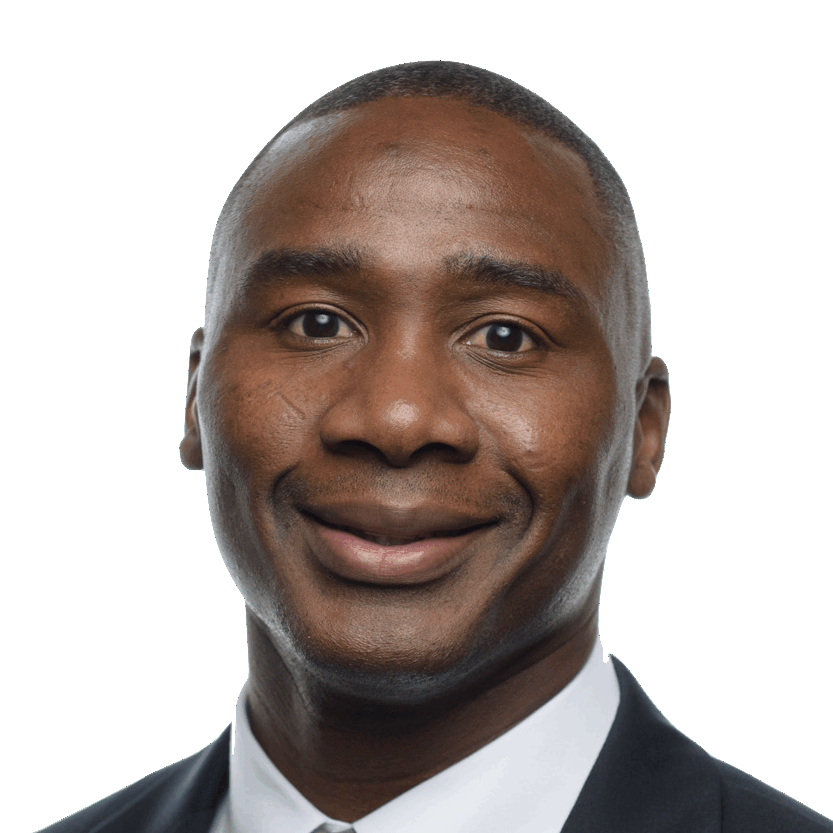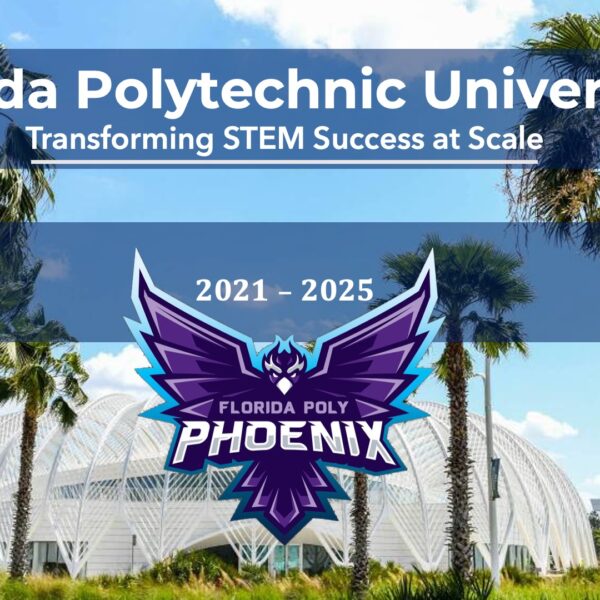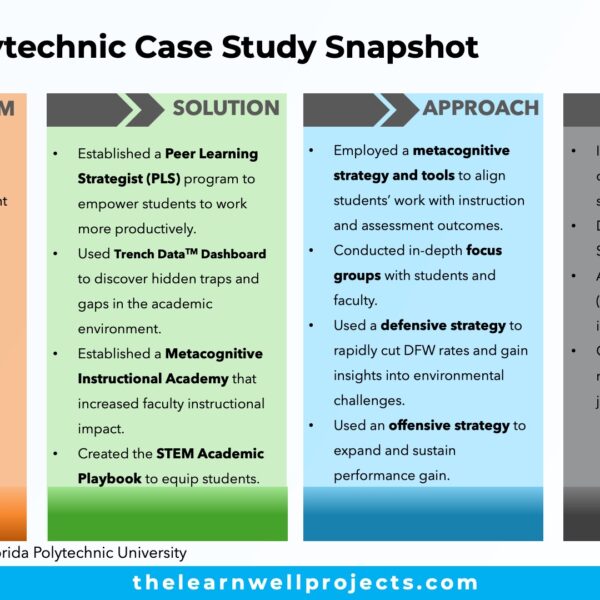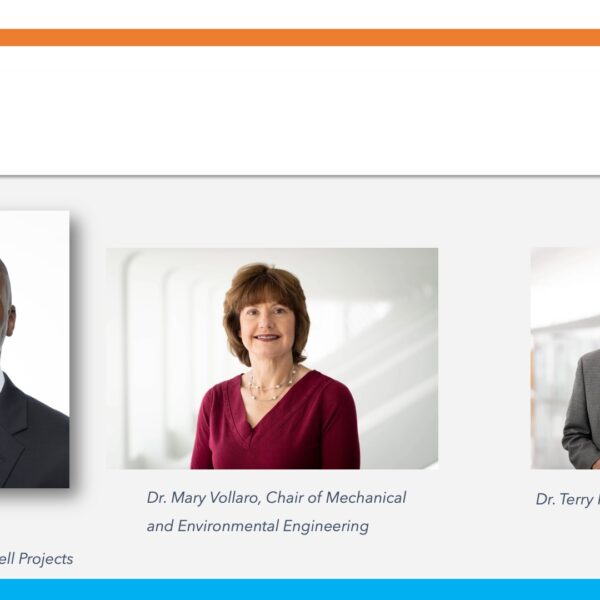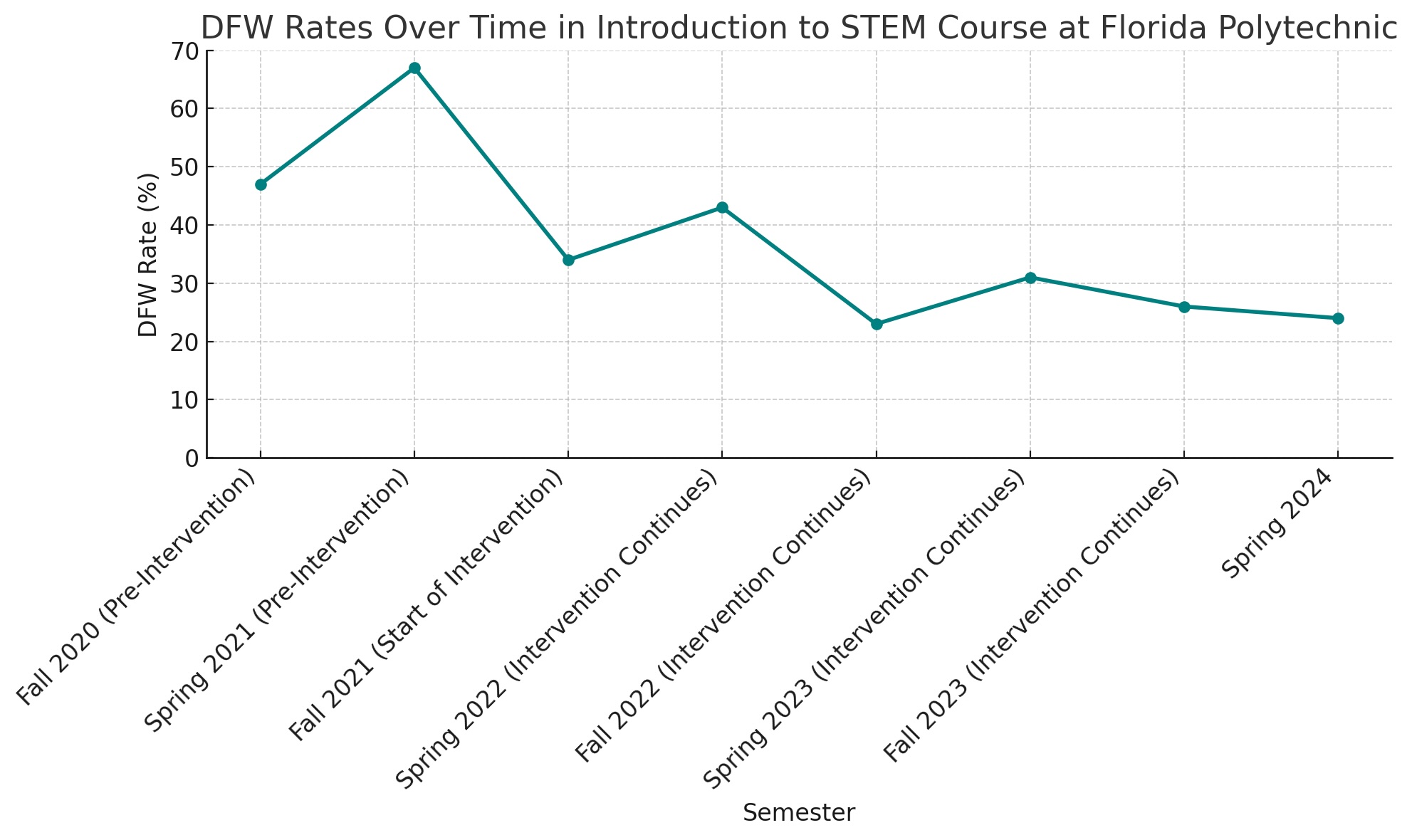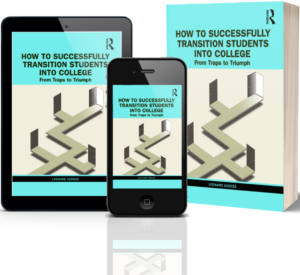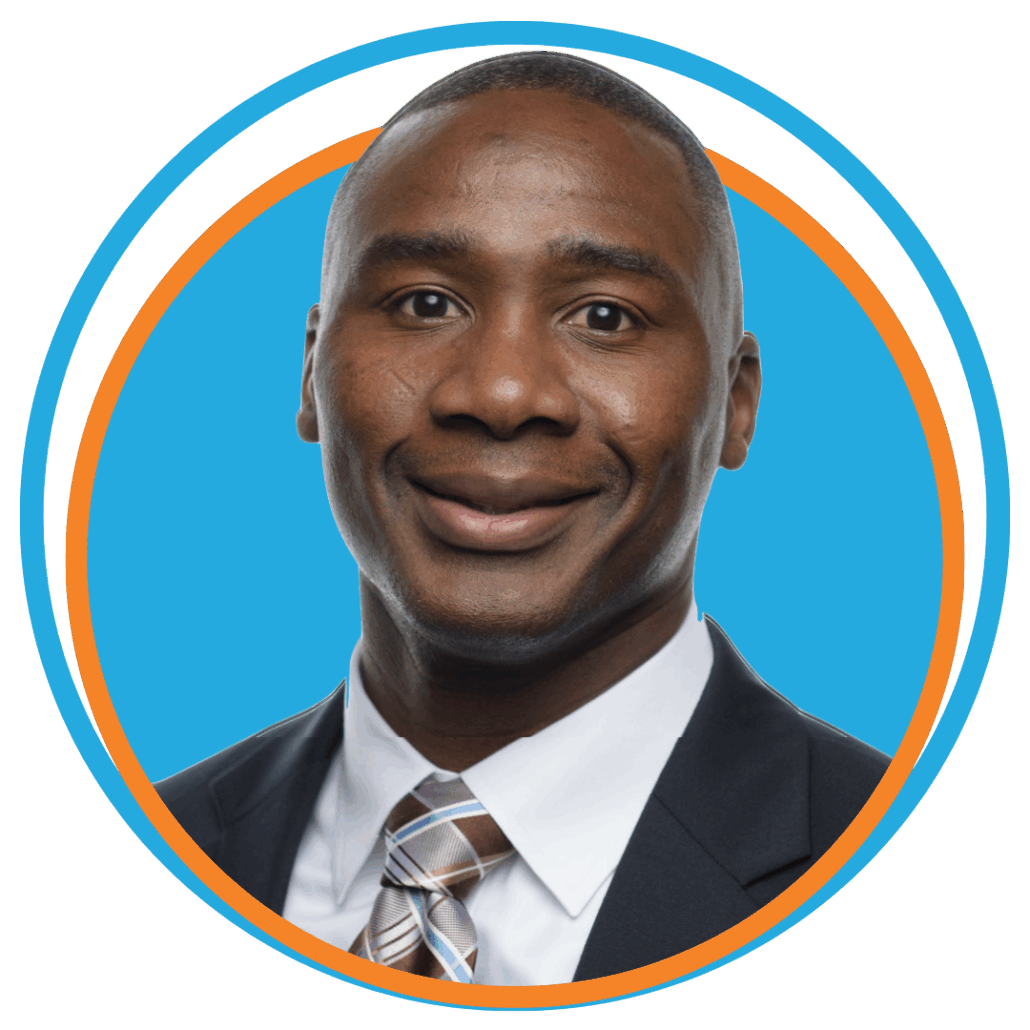Florida Polytechnic’s Partnership with The LearnWell Projects Immediately Reduced DFW Rates and Sustainably Boosted Retention, Enrollment, and Financial Health
Click the images above to view the gallery overview.
Florida’s only public polytechnic university, focusing solely on STEM education, is on a winning streak. It has enjoyed record enrollment for the past three years. But in 2020, Florida Polytechnic was facing a critical inflection point. Nearly two-thirds (67%) of students in its critical first-year gateway course were earning Ds, Fs, or withdrawing (DFW). The persistent low performance threatened student retention, academic morale, and the university’s financial future. Traditional academic support approaches, course redesigns and professional development had failed to produce sustainable results.
As a performance-based, STEM-only institution, Florida Poly faced a challenge few universities encounter. Bound by strict state performance metrics, the university could not lower academic standards, nor could it redirect students away from rigorous math and science requirements into “easier” alternatives. Traditional fixes—tutoring expansions, course redesigns, and faculty workshops—had failed to move the needle. What Florida Poly needed was a strategy that could rapidly elevate student performance, equipping learners with transferable, high-level competencies to succeed both inside and outside the classroom. The LearnWell Projects’ metacognitive approach offered exactly that, providing a framework that resonated with faculty, administration, and students.
What set The LearnWell Projects apart was their ability to clearly articulate not just that our students needed a different kind of academic preparation, but exactly how to achieve it. They provided the tools and strategies to empower students to engage in higher-quality academic work—and we saw the difference immediately. — Dr. Mary Vollaro, Chair of Mechanical and Environmental Engineering, 2021
In August of 2021, Florida Polytechnic University was losing too many new students. Its DFW rate in its gateway courses hovered around 67%. Immediately, the DFW rate began plummeting to 24%, which boosted retention and improved financial conditions. By November 2024, I was co-presenting with Florida Poly faculty and administrators as invited speakers at the American Association of Colleges and Universities Transforming (AAC&U) STEM Education Conference in Washington, DC, where we shared the blueprint we used to achieve such a remarkable rise in academic success.
In just three years, Florida Polytechnic transformed its first-year STEM outcomes and empowered its students and faculty. Through targeted academic support and strategic resources, DFW rates dropped from a pre-intervention high of 67% to a consistent 24% by Spring 2024. This intervention equipped students with essential learning skills and spurred institutional benefits: higher retention, rising enrollment, and improved financial stability. The story underscores a powerful truth—when student success is prioritized, the entire institution thrives.
The consultancy immediately caused a 33% drop in the D, F, and W rates from Spring 2020 to Fall 2021.
The reductions in D,F, W rates continued to decline each semester as the consultancy continued.
And here’s the rest of the story…
Identifying a Challenge in First-Year STEM
In 2020, Florida Polytechnic University faced a critical challenge in its first-year STEM curriculum: DFW (grades of D, F, or withdrawal) rates in its Introduction to STEM course reached an alarming 47% in the Fall of 2020 and climbed to 67% by the Spring of 2021. These numbers highlighted a clear issue with student readiness and support in one of the institution’s core courses, a foundational requirement for all first-year students. Recognizing that these high DFW rates could have long-term implications for student retention and institutional success, the university took decisive action.
Choosing the Correct Solution
The administration considered launching a mentoring program or expanding tutoring and academic coaching services. However, after an initial consultation, institutional leaders took my advice and partnered with me to establish a metacognitive-based Peer Learning Strategist (PLS) Program.
The Learning Center Plays Defense
In Fall 2021, the university partnered with The LearnWell Projects to tackle these challenges head-on. After collecting initial data, they established a Peer Learning Strategist program as a defensive strategy. The program used a network of metacognitive resources to train select students to provide metacognitive assistance to their peers. The defensive approach’s second facet was collecting Trench Data ™ from student interactions with Peer Learning Strategists. This new data source offered a clear view of students’ academic strengths and weaknesses, allowing the university to tailor support effectively. The PLS program had an immediate impact, significantly improving success rates in the Introduction to STEM course by 33% from Spring 2021 to Fall 2022.
Creating A Complementary Learning Environment
In Spring 2022, we leveraged Trench Data ™ insights to help the institution’s stakeholders — students, faculty, staff, and administrators— move from merely controlling enrollment to actively enhancing it through expanded academic success in upper-level courses. The data revealed that a broader range of students were putting effort into their studies but often in unproductive ways, which sustained an undercurrent of student frustration, drained faculty energy, and hindered the institution’s focus on addressing core issues.
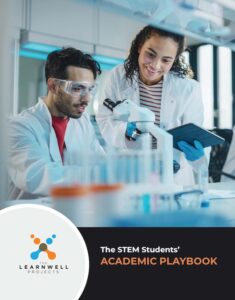 A key solution derived from this data was the STEM Students’ Academic Playbook, a customized resource that guided students through overcoming a range of STEM-related challenges that were previously limiting their performance.
A key solution derived from this data was the STEM Students’ Academic Playbook, a customized resource that guided students through overcoming a range of STEM-related challenges that were previously limiting their performance.
Institution Goes on Offense
Starting in Fall 2022, the institution leveraged the Trench Data ™ lessons to go on offense. A chief component of the offensive strategy was a Metacognitive Instructional Academy, which supported faculty in making strategic adjustments to their teaching to boost student engagement in class and improve academic practices outside the classroom.
By combining defensive and offensive strategies, the institution reaped the rewards of a holistic approach to student support.
Sustained Success: A Semester-by-Semester Decrease in DFW Rates
The intervention’s impact was both immediate and enduring. As shown in the chart below, the DFW rate dropped significantly each semester, falling from a pre-intervention high to 34% in the program’s first semester. By Fall 2022, the rate had decreased further to 23%; as of Spring 2025, it remained low at 20%.
The semester-by-semester table at the top of this page offers a closer look at these improvements. It demonstrates the reduction in DFW rates as more students completed the intervention-supported Introduction to STEM course. The consistent decline in DFW rates across multiple semesters underscores the strength and sustainability of the intervention’s impact.
Faculty and Student Testimonials
The difference in student preparation has been remarkable. Students are better equipped for upper-level courses and demonstrate resilience and engagement that we didn’t see consistently beforehand. They’re more confident and capable, which shows in their work. -Dr. Mary Vollaro, Chair of the Department of Mechanical Engineering.
I struggled a lot in my first semester, especially with how to study effectively. Working with a PLS made a huge difference—it taught me to approach STEM subjects strategically and holistically. Looking back on it, I realize I wasted so much time! I am way more prepared for my classes now. – Jake, second-year engineering student.
Compounding Academic and Financial Benefits
Beyond the reduction in DFW rates, the intervention has contributed to higher retention rates across the university. Faculty surveys in upper-level STEM courses indicate that students who completed the enhanced Introduction to STEM course are better prepared than those who took the course before the intervention. As students achieve greater academic success and stay engaged in their programs, Florida Polytechnic has seen increased retention rates and, consequently, enrollment growth.
This academic success has led to institutional financial benefits. Higher retention means a more stable and engaged student body, while increased enrollment brings additional funding to support future initiatives. The LearnWell partnership demonstrates that prioritizing student success can create a ripple effect, improving academic outcomes and supporting institutional growth.
A Model for Success
Florida Polytechnic’s partnership with The LearnWell Projects is a testament to the powerful relationship between student success, enrollment growth, and institutional stability. This transformative journey underscores a key lesson for higher education institutions: when students are equipped with the skills they need to succeed, everyone benefits—from the individual student to the entire university community. This approach not only enriches the student experience but also fosters a sustainable future for the institution.
Read all about it.
The Florida Polytechnic is one of many success stories in How to Successfully Transition Students into College: From Traps to Triumph. Also, Dr. Vollaro and Leonard Geddes, Founder of The LearnWell Projects, were invited presenters at the 2024 AAC&U Transforming STEM Higher Education Conference in Washington, DC, in November 2024.
Supporting Articles
- Florida Poly kicks off year with record enrollment
- Florida Poly ranks Top 10 in U.S. for career outcomes, No. 1 among public universities
- Florida Poly ranks No. 1 public college in Southeast for 4th straight year
Additional Community Quotes
I have seen firsthand how The LearnWell Projects partnership has created a sense of confidence and purpose among our faculty. They are developing a mindset of continuous improvement. This intervention has given them the tools to teach more impactfully, which is also helping our retention and graduation rates. -Dr. Terry Parker, Provost
Before the PLS program, I felt like I was drowning in my STEM classes. I didn’t know how to manage all the material, and I always felt overwhelmed. My PLS showed me how to use my course syllabus and notes together and ways to break down complex topics to study more effectively. I was making Ds, but I made As on my latest tests.” – Samantha, First-Year Computer Science Student
I didn’t realize how important study habits were until I started this program. I thought I could just go with the flow, but the Playbook really helped me understand how to approach my STEM classes in a way that made sense. I went from barely passing to making As easily. – Alex, First-Year Physics Student
Honestly, I was considering dropping out after my first semester because it felt too hard to keep up. After working with a Peer Learning Strategist, I found out that it wasn’t the material that was impossible—it was how I was approaching it. Now, I’m doing way better and actually enjoying my major. – Jasmine, Second-Year Engineering Student
The LearnWell intervention has not only improved students’ pass rates but has elevated the entire classroom environment. Students come to class more engaged, better prepared, and eager to participate. We’re seeing a noticeable shift in how they approach complex topics—they’re more resilient and proactive in tackling challenges. – Professor Kozekanan, Mechanical Engineering
As faculty, we used to spend a lot of time on basic study skills that should already be in place by the time students get to college. The consultancy has allowed us to focus on deeper content because students now come equipped with solid foundational skills. This has changed the entire dynamic of our upper-level STEM courses. – Professor Denis, Computer Science
